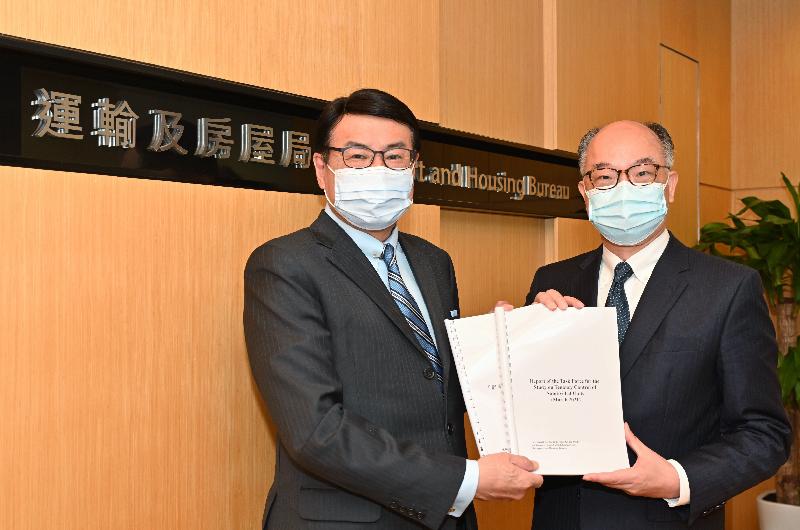The Task Force for the Study on Tenancy Control of Subdivided Units (Task Force) submitted its report to the Government today (March 31), setting out the current situation of subdivided units (SDUs) in Hong Kong and providing views and recommendations to the Government on whether tenancy control on SDUs should be introduced in Hong Kong and the possible options. The Government would carefully consider the recommendations put forward by the Task Force, and introduce the relevant bill into the Legislative Council as soon as possible within the current legislative session.
The Secretary for Transport and Housing, Mr Frank Chan Fan, thanked the Task Force, under the chairmanship of Professor William Leung, for conducting a comprehensive, in-depth and professional study on the issues relating to tenancy control on SDUs in Hong Kong, and for advancing the completion of the study and submission of the report to the Government by three months in view of the public's concerns about the subject.
The Government noted that the Task Force considered in principle that the Government should implement suitable tenancy control on SDUs in order to safeguard the interests of SDU tenants, and recommends that the tenancy control measures on SDUs be effected through legislation. The tenancy control measures recommended by the Task Force included:
(a) formulate a "standard tenancy agreement" with mandatory terms, such as the term of a regulated tenancy shall be fixed for two years, and only the tenant shall have the right to terminate the tenancy agreement after 12 months into the tenancy by giving one month's notice to the landlord; the tenant shall not be liable to make payment to the landlord other than the rent, deposit and reimbursement of utility charges as apportioned by the landlord; the total of the utility charges (including electricity and water charges) payable by all tenants of the unit shall not exceed the amount charged in the relevant utility bill; the deposit shall be refunded to the tenant by the landlord within a specified period; and the landlord shall be responsible for the stamp duty of the tenancy agreement;
(b) if the SDU landlord and tenant have not entered into a written tenancy agreement at the outset, the tenant shall have a right to demand the landlord to provide a written tenancy agreement within a specified period. If the landlord fails to do so, the tenant can withhold the payment of the rent of one month or of a longer period until the landlord has fulfilled this requirement;
(c) as a deterrent, a landlord of a regulated tenancy may commit an offence and be subject to penalties if he requests the tenant to make payments other than for the rent, deposit and utility charges as apportioned by the landlord, or requests reimbursement of utility charges from the tenant where the total of apportioned utility charges for all tenants of the unit exceeds the amount charged in the relevant bill;
(d) on security of tenure, the tenant of a regulated tenancy shall have the right to renew the tenancy once, thus enjoying four years of security of tenure;
(e) on tenancy renewal, there shall be a cap on the rate of rent increase, which shall not be more than the percentage change of the private domestic rental index (all classes) of the Rating and Valuation Department (RVD) in the relevant period; or 15 per cent, whichever is the lower. If the relevant change of the above RVD rental index is negative, the rent of the renewed regulated tenancy shall be decreased by at least the same percentage; and
(f) to address the issue of subletting, the head lessor, when terminating the head lease and regaining possession of the premises, shall be obliged to provide the affected SDU tenants a sufficiently long notice period (such as 60 days) to enable them to look for alternative accommodation.
The Government further noted that to ensure that the proposed tenancy control measures would be effectively administered, the Task Force recommended that the Government should increase resources for the RVD to promote public awareness of the new regulatory regime, provide related advisory and mediatory services, collect and publish information about SDU rentals, and take enforcement action. Resources should also be enhanced for the Lands Tribunal and relevant courts to expedite the processing of relevant disputes arising from the implementation of the proposed tenancy control measures. The Task Force further suggested that the Government may consider entrusting a non-governmental organisation to set up and run an SDU rental information portal, to arrange briefing sessions at the district level, and to provide the necessary support for SDU landlords and tenants.
The THB set up the Task Force on April 16, 2020. Since its establishment, the Task Force has held a series of meetings and appointed independent scholars/institutions to conduct thematic researches on the social, economic and legal issues involved and to carry out a survey on the actual situation of SDUs and the socio-economic characteristics of SDU tenants. Despite the COVID-19 pandemic, Task Force members have paid visits to SDU tenants in various districts, and held a number of online meetings with a total of 36 concern groups and organised two public forums to gather the views of stakeholders and members of the public on introducing tenancy control on SDUs in Hong Kong.
The report of the Task Force has been uploaded to the website of the THB (www.thb.gov.hk/eng/contact/housing/matter_tc.htm).
Follow this news feed: East Asia






